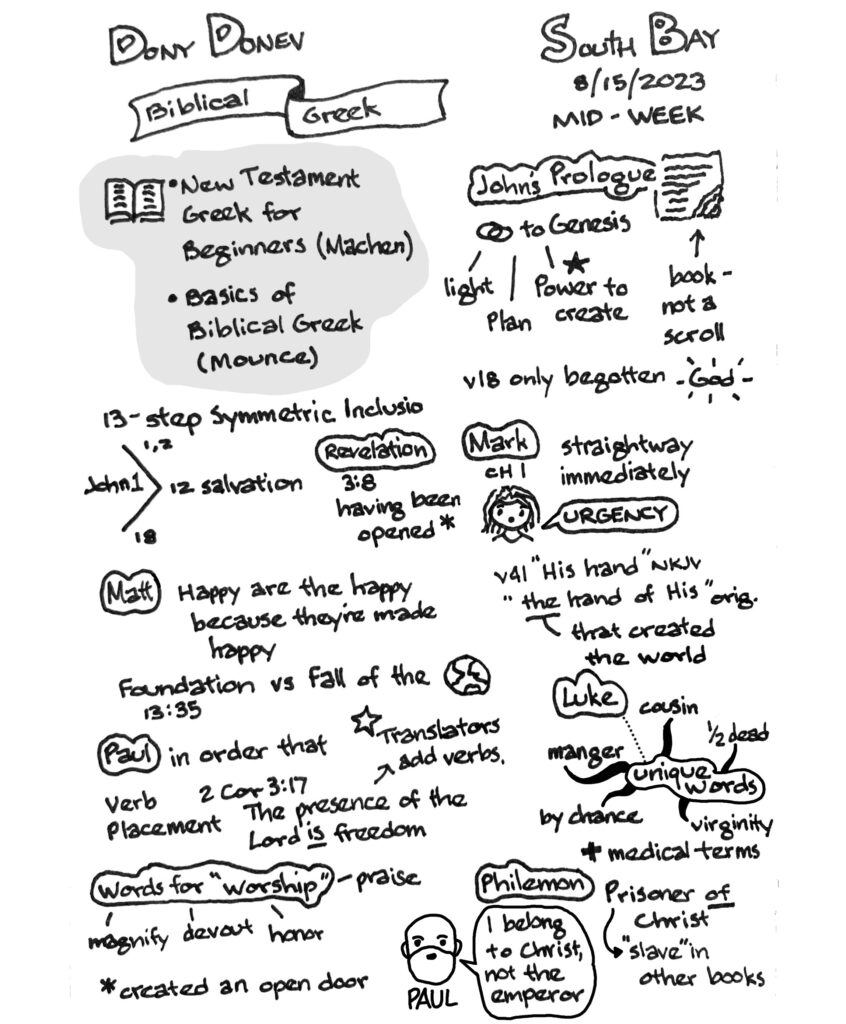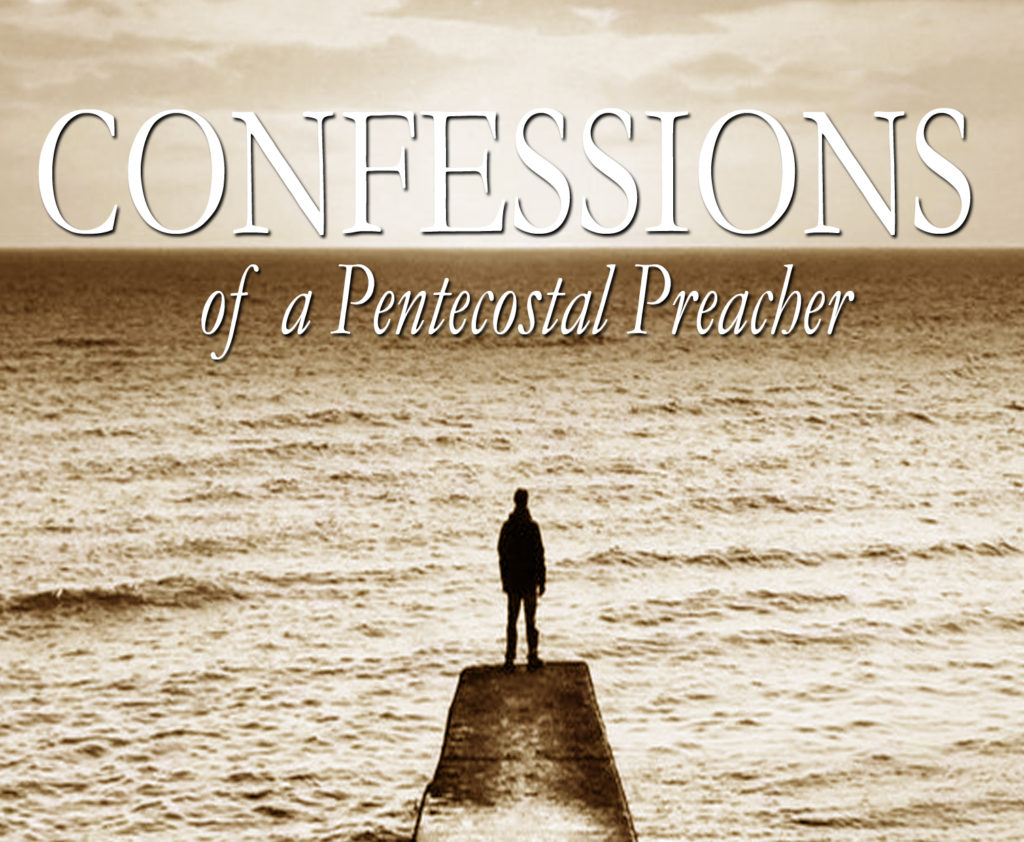SIGNS of the LAST DAYS: Increased worldly knowledge

HOMESCHOOL SANCTUARY COUNTY

Teaching Biblical Greek

TRUTHS from AZUSA STREET REVIVAL by Frank Bartleman
“A revival almost always begins among the laity. The ecclesiastical leaders seldom welcome reformation.”
One reason for the depth of the work at “Azusa” was the fact that
the workers were not novices. They were largely called and prepared
for years, from the Holiness ranks, and from the mission field, etc.
They had been burnt out, tried and proven. They were largely
seasoned veterans. They had walked with God and learned deeply
of His Spirit. These were pioneers, “shock troops,” the Gideon´s
three hundred, to spread the fire around the world. Just as the
disciples had been prepared by Jesus.
We have now taken on a “mixed multitude.” And the seeds of
apostacy have had time to work. “First love” has been also
largely lost. The dog has “returned to his vomit” in many cases,
to Babylonic doctrines and practices. An enfeebled mother can
hardly be expected to bring forth healthy children.
The very truths that gave birth to the Pentecostal movement are
today generally rejected as too strong.
A revival almost always begins among the laity. The ecclesiastical
leaders seldom welcome reformation. History repeats itself. The
present leaders are too comfortably situated as a rule to desire
innovation that might require sacrifice on their part. And God’s
fire only falls on sacrifice. An empty altar receives no fire!
God has always sought a humble people. He can use no other…
There is always much need of heart preperation, in humility and
separation, before God can consistently come. The depth of
any revival will be determined exactly by the spirit of repentance
that is obtained. In fact, this is key to every true revival born of God.
Men’s hearts are being searched…it is a tremendous sifting time,
not only of actions but of inner motives. Nothing can escape the
all-searching eye of God.
Frank Bartleman: God Was in the Earthquake
Frank Bartleman was greatly used as a vessel of the Lord in intercession, and as a writer both before and during the Azusa Street Revival which began in 1906. The very same month and year that the revival began, the great San Francisco earthquake occurred. Frank Bartleman saw this as being the hand of God and quickly wrote a tract which was widely distributed.
By Frank Bartleman
“I found the earthquake had opened many hearts. I was distributing especially my last tract, The Last Call. It seemed very appropriate after the earthquake. Sunday, April 22, I took 10,000 of these to the New Testament Church. The workers seized them eagerly and scattered them quickly throughout the city.
Nearly every pulpit in the land was working overtime to prove that God had nothing to do with earthquakes and thus allay the fears of the people. The Spirit was striving to knock at hearts with conviction, through this judgment. I felt indignation that the preachers should be used of Satan to drown out His voice. Just as he later used them to stir up hatred and murder, during the great war. Even the teachers in the schools labored hard to convince the children that God was not in earthquakes. The devil put on a big propaganda on this line.
I had been much in prayer since the earthquake, and had slept little. After the shock in Los Angeles the Lord told me definitely He had a message for me for the people. On the Saturday after, He gave me a part of it. On Monday the rest was given. I finished writing it at 12:30 a.m. Tuesday, ready for the printer. I kneeled before the Lord and He met me in a powerful way, a powerful witness that the message was from Him. I was to have it printed in the morning. From that time until 4 a.m., I was wonderfully taken up in the spirit of intercession. I seemed to feel the wrath of God against the people and to withstand it in prayer. He showed me He was terribly grieved at their obstinacy in the face of His judgment on sin. San Francisco was a terribly wicked city.
He showed me all hell was being moved to drown out His voice in the earthquake, if possible. The message He had given me was to counteract this influence. Men had been denying His presence in the earthquake. Now He would speak. It was a terrific message He had given me. I was to argue the question with no man, but simply give them the message. They would answer to Him. I felt all hell against me in this, and so it proved. I went to bed at 4 o’clock, arose at 7, and hurried with the message to the printer.
The question in almost every heart was, Did God do that? But instinct taught men on the spot that He had. Even the wicked were conscious of the fact. The tract was set up quickly. The same day it was on the press, and the next noon I had my first consignment of the tract. I was impressed I must hasten and get them to the people as quickly as possible. I was reminded that the ten days I was called by the Lord to prayer was up the very day I received the first of the tracts. I understood it all now, clearly.
I distributed the message speedily in the missions, churches, saloons, business houses, and in fact everywhere, both in Los Angeles and Pasadena. Besides I mailed thousands to workers in nearby towns for distribution.
Many raved at the message. A man followed me on the street raving like a maniac. He followed me into a business house, to do me violence. But the Lord protected. He then tore my tract up publicly at the curb, to show his hate. Many threw the message down in a rage, only to pick it up again and read it. It seemed God held them to it.
Everyone was curious for the tract, though it burned the most of them like fire. Sometimes they would get so excited on the street cars they would get off before they reached their street. My very presence seemed to convict many. The message struck consternation to thousands of souls. I have never written a tract that had so much influence.
Sunday, May 11, I had finished my Earthquake tract distribution. Then the burden suddenly left me. My work was done, Seventy-five thousand had been published and distributed in Los Angeles and Southern California, in less than three weeks time. At Oakland, Brother Manley, of his own volition, had printed and distributed 50,000 more, in the Bay Cities and ’round about, in about the same space of time. The following are some extracts from the Earthquake tract:
But what had God to do with earthquakes? When Thy judgments are in the earth, the inhabitants of the world learn righteousness (Isaiah 26:9). Which removeth the mountains, when He overturneth them in His anger, which shaketh the earth out of her place, and the pillars thereof tremble (Job 9:5-6). The mountains quake at Him, and the hills melt; and the earth is upheaved at His presence, yea, the world, and all that dwell therein. His fury is poured out like fire, and the rocks are broken asunder by Him (Nahum 1:5-6). And I will punish the world for their evil. Therefore I will make the heavens to tremble, and the earth shall be shaken our of her place, in the day of His fierce anger (Isaiah 13:11, 13).
Then the earth shook and trembled, the foundations also of the mountains moved, and were shaken because He was wroth. There went up a smoke in His wrath, and fire out of His mouth devoured. The Lord thundered from Heaven, and the Most High uttered His voice. Then the channels of the sea appeared, the foundations of the world were laid bare, by the rebuke of the Lord, at the blast of the breath of His anger (Psalm 18).
Behold, the Lord maketh the earth empty, and turneth it upside down (perverteth the face thereof), and scattereth abroad the inhabitants thereof. The foundations of the earth do shake, the earth is utterly broken, the earth is moved exceedingly. The earth shall stagger like a drunken man, and shall be moved to and fro. The transgression thereof shall be heavy upon it. (Isaiah 24:1, 18, 20). Thou shalt be visited of the Lord of Hosts with earthquakes, and great noise, and the flame of a devouring fire. (Isaiah 29:6). Men shall go into the caves of the rocks, from before the terror of the Lord, when he arises to shake terribly the earth (Isaiah 2:19). And the seventh angel poured out his vial into the air and there was a great earthquake (Revelation 16:17,18).
And will you claim there is no God in earthquakes? John Wesley has said, Of all the judgments which the righteous God inflicts on sinners here, the most dreadful and destructive is an earthquake. From Earthquake Tract, April 1906.
SIGNS of the LAST DAYS: NEW tower of BABEL







SIGNS of the LAST DAYS: The Antichrist

Celebrating 30 Years in America
I received my first visa for the United States exactly 30 years ago, after a meeting with Dr. Lovell R. Cary and Bobby G. Ross. My interview was consecutively scheduled for the day before Christmas, December 23, 1993. Because of the short time, it was conducted and approved personally by the head consular at the U.S. Embassy in Sofia. The cost of the visa was $23. I had only $18 in my pocket. If five bucks had ever made a bigger difference in my life…
I landed in New York late one cold, snowy, January night. Being barely 19 at the time (fixing to be 50 now), I had recently watched Home Alone: Lost in New York. Landing over the brightly lit Manhattan was just like in the movie. The feeling was indescribable.
The first person I spoke with on American land was of course the customs officer. Having reviewed my student visa issued for East Coast Bible College, he suddenly went on an endless rant about how bad Bible colleges are, what is done to students in secret, and how they often operate as a cult. Just now, 30 years later, I am making the connection that as a law enforcement officer, he may have been influenced by the recent David Coresh incident. With this sour taste in my mouth, a blizzard outside and too late to catch even the red-eye flight, I somehow managed to book a hotel for the night and flight for the next morning.
I went under the slow falling snow outside the JFK terminal to wait for the hotel shuttle, only to find myself next to a distinguished lady with a long fur coat waiting for her limo – a NY type, as I am reflecting now from the distance of time. She asked if this was my first time in America – must have been that obvious. And when I affirmed, she pulled a dime out of her pocket, placed it in my hand and to my greatest surprise asked if I knew what it says. I had enough Latin under my belt to tell her the meaning of E Pluribus Unum, to which she replied, “Welcome to America! All of us have come here from somewhere.”
And so, my journey began. Having preached multiple times a week in Bulgaria, my heart was burning to share my experience and message as for the first time in my life, I was seeing churches on virtually every corner. Let’s just say that in the mid-90s, most Pentecostal churches in the Bible Belt were not too eager to let in their pulpit a big Bulgarian with thick Balkan accent. Not much has changed to this regard in 30-years of course. But the ones who were willing are still friends to this very day. And though there have been many agendas for my life, I am still here, still preaching. And still planning to continue to do exactly the same. So, help me God!
CONFESSIONS of a Pentecostal Preacher
To Mark Alan
We know not why good people have to die,
but we do know we must tell their story…
Chapter I: Beyond the Church and into God
Be without fear in the face of your enemies.
Be brave and upright that God may love thee.
Speak the truth always, even if it leads to your death.
Safeguard the helpless and do no wrong.
That is your oath.
~Kingdom of Heaven (2005)
Separation of church from politics of false religiosity
The phone rang heavy and long. It was 4 AM in Bulgaria, but I was already up. A friend on the other end of the line was calling from South Carolina with a warning of some bad situation. The following morning, I was going to be contacted by the Director questioning why we were ministering in churches outside of our denomination.
The truth was we had ministered in some 300 local churches across the Balkan country of Bulgaria crossing all denominational boundaries and gathering youth from just about every confession. God had used us not only to reach and minister and to lead, but to step into an untouched spiritual realm, to undertake an unfamiliar ministry paradigm and to approach a brand new dimension of reality where He was to be the center of it all. And we had obeyed without questions. Now it was time to pay the price!
* * *
Our denomination, the one to which I remain both critically loyal and loyally critical, spreads over some five generations. Through its century old existence, the struggles and tension between theology and praxis has been in the center. And there, in the very essence of Pentecostalism itself, while some are always celebrating and being celebrated in the office or temple, others are always pushed in the periphery of normal life, hidden from the world behind closed doors and seeking a much deeper experience with God.
These modern day mystics are not only forgotten, but often forbidden. For their riot for righteousness cannot be conceived, contained and controlled by the religious norms of organized officiality. They speak as prophets to a world they so fervently try to escape from, about a reality that does not exist in the normal believer’s mindset. A stage of spirituality that cannot be preached without being lived in the social existence. And a relationship of God that goes far beyond common relationism and into God himself. That God, Who does not abide in offices and temples, but on the cross outside of the city walls…
But I knew nothing of this until that cold winter morning when the phone rang through darkness of the night. Knowing what is coming, rarely changes what we have done to get here.
7 Years in Bulgaria: CONFESSIONS of a Pentecostal Preacher
by Dony K. Donev, D.Min.
Upcoming Releases for United States
SIGNS of the LAST DAYS: Revived Roman Empire

SIGNS of the LAST DAYS: Earthquakes, floods, famines and plagues









